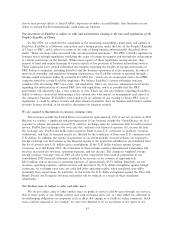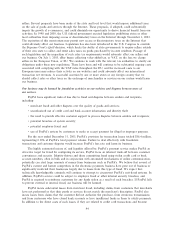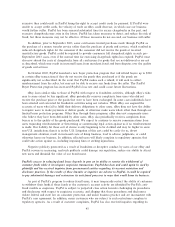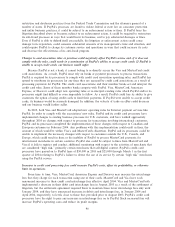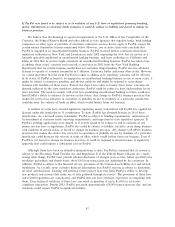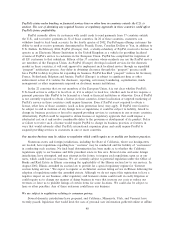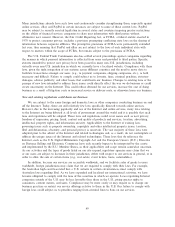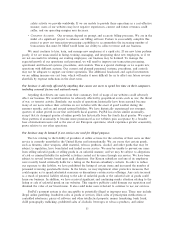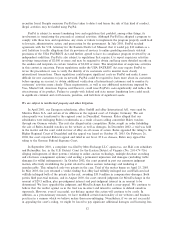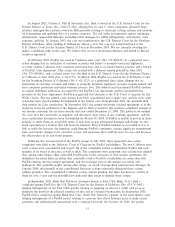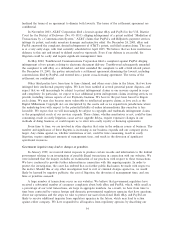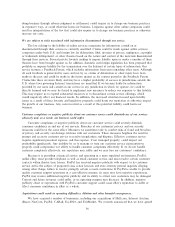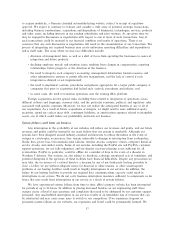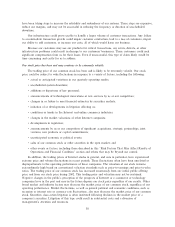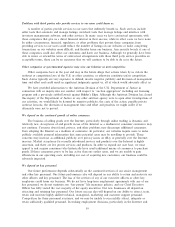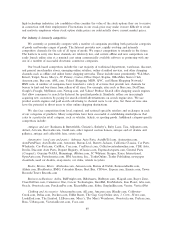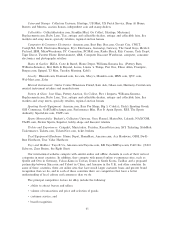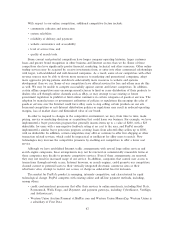eBay 2003 Annual Report Download - page 54
Download and view the complete annual report
Please find page 54 of the 2003 eBay annual report below. You can navigate through the pages in the report by either clicking on the pages listed below, or by using the keyword search tool below to find specific information within the annual report.securities fraud. Despite measures PayPal has taken to detect and lessen the risk of this kind of conduct,
illegal activities may be funded using PayPal.
PayPal is subject to money laundering laws and regulations that prohibit, among other things, its
involvement in transferring the proceeds of criminal activities. Although PayPal has adopted a program to
comply with these laws and regulations, any errors or failure to implement the program properly could lead
to lawsuits, administrative action, and prosecution by the government. In July 2003, PayPal reached
agreement with the U.S. Attorney for the Eastern District of Missouri that it would pay $10 million as a
civil forfeiture to settle allegations that its provision of services to online gambling merchants violated
provisions of the USA PATRIOT Act and further agreed to have its compliance program reviewed by an
independent audit Ñrm. PayPal is also subject to regulations that require it to report suspicious activities
involving transactions of $2,000 or more and may be required to obtain and keep more detailed records on
the senders and recipients in certain transfers of $3,000 or more. The interpretation of suspicious activities
in this context is uncertain. Future regulations under the USA PATRIOT Act may require PayPal to
revise the procedures it uses to verify the identity of its customers and to monitor more closely
international transactions. These regulations could impose signiÑcant costs on PayPal and make it more
diÇcult for new customers to join its network. PayPal could be required to learn more about its customers
before opening an account, to obtain additional veriÑcation of international customers and to monitor its
customers' activities more closely. These requirements, as well as any additional restrictions imposed by
Visa, MasterCard, American Express and Discover, could raise PayPal's costs signiÑcantly and reduce the
attractiveness of its product. Failure to comply with federal and state money laundering laws could result
in signiÑcant criminal and civil lawsuits, penalties, and forfeiture of signiÑcant assets.
We are subject to intellectual property and other litigation.
In April 2001, our European subsidiaries, eBay GmbH and eBay International AG, were sued by
Montres Rolex S.A. and certain of its aÇliates in the regional court of Cologne, Germany. The suit
subsequently was transferred to the regional court in Dusseldorf, Germany. Rolex alleged that our
subsidiaries were infringing Rolex's trademarks as a result of users selling counterfeit Rolex watches
through our German website. The suit also alleged unfair competition. Rolex sought an order forbidding
the sale of Rolex-branded watches on the website as well as damages. In December 2002, a trial was held
in the matter and the court ruled in favor of eBay on all causes of action. Rolex appealed the ruling to the
Higher Regional Court of Dusseldorf and the appeal was heard on October 30, 2003. On February 26,
2004, the court rejected Rolex's appeal and ruled in our favor. If it so chooses, Rolex may appeal the
ruling to the German Federal Supreme Court.
In September 2001, a complaint was Ñled by MercExchange LLC against us, our Half.com subsidiary
and ReturnBuy, Inc. in the U.S. District Court for the Eastern District of Virginia (No. 2:01-CV-736)
alleging infringement of three patents (relating to online auction technology, multiple database searching
and electronic consignment systems) and seeking a permanent injunction and damages (including treble
damages for willful infringement). In October 2002, the court granted in part our summary judgment
motion, eÅectively invalidating the patent related to online auction technology and rendering it
unenforceable. This ruling left only two patents in the case. Trial of the matter began on April 23, 2003.
In May 2003, the jury returned a verdict Ñnding that eBay had willfully infringed one and Half.com had
willfully infringed both of the patents in the suit, awarding $35.0 million in compensatory damages. Both
parties Ñled post-trial motions, and in August 2003, the court entered judgment for MercExchange in the
amount of $29.5 million, plus pre-judgment interest and post-judgment interest in an amount to be
determined. We have appealed the judgment and MercExchange has Ñled a cross-appeal. We continue to
believe that the verdict against us in the trial was incorrect and intend to continue to defend ourselves
vigorously. However, even if successful, our defense against this action will continue to be costly. In
addition, as a precautionary measure, we have modiÑed certain functionality of our websites and business
practices in a manner which we believe makes them non-infringing. Nonetheless, if we are not successful
in appealing the court's ruling, we might be forced to pay signiÑcant additional damages and licensing fees.
52



